6 Best Crypto Exchanges in the Philippines
.webp)
Trading in the Philippine crypto market in 2026 requires a focus on Bangko Sentral ng Pilipinas (BSP) regulation and seamless PHP integration through crypto exchanges.
This guide evaluates the top investment platforms based on security, low fees, and ease of use for both beginners and experienced traders.
Whether you prefer the convenience of mobile wallets like GCash and Maya or the high liquidity of global exchanges, our selection identifies the most reliable and compliant choices for 2026.
Top Picks: Best Platforms for 2026
Bitunix is a top global crypto exchange that serves 3 million+ users across the Philippines and 100+ other countries. It provides spot and futures trading, plus staking, copy trading and more.
PHP Deposit Methods
Cards, Bank Transfers, Apple Pay, GCash
Supported Cryptocurrencies
700+ pairs including BTC, ETH, SOL & more
Security
1:1 PoR, MPC custody, Hacken-audited
Compare Top Filipino Crypto Exchanges
1. Bitunix
Bitunix has claimed the top spot in the Philippines for 2026 by balancing elite performance with a clean user experience. It offers a massive catalog of more than 700 trading pairs. With daily spot volumes frequently hitting the $1.8 billion mark, liquidity is rarely an issue even for larger orders.
For active Filipino traders, Bitunix stands out for its futures suite, offering 125x leverage, real-time risk controls, and deep order books. The exchange also integrates copy trading and grid tools, allowing users to deploy strategies without managing every trade manually.
It has become the go-to exchange for Filipinos who want a single app that handles everything. The interface is optimized for "Ultra Mode" charting, giving professional-level technical analysis tools to users who prefer trading on their smartphones during their commute or at a café.
Pros
- Bitunix offers some of the lowest fees in the region, with maker fees starting at just 0.02%, making it incredibly affordable for high-frequency traders.
- The platform provides a "no-mandatory KYC" option for basic trading, giving users flexibility while still offering a $2 million daily withdrawal limit for verified accounts.
- Offers diverse PHP payment methods, including bank transfers, cards, Apple Pay, plus P2P methods like GCash.
Cons
- Bitunix does not provide a Tagalog user interface, but it does offer English-language support.
- The "Ultra Chart" and dense feature set can feel overwhelming for absolute beginners who just want to buy their first PHP 500 of Bitcoin.
- Bitunix does not currently hold a direct BSP VASP license, meaning it operates as a global entity rather than a locally regulated Philippine firm. However, it is considered safe as it regularly publishes Proof of Reserves and holds licenses in other jurisdictions.
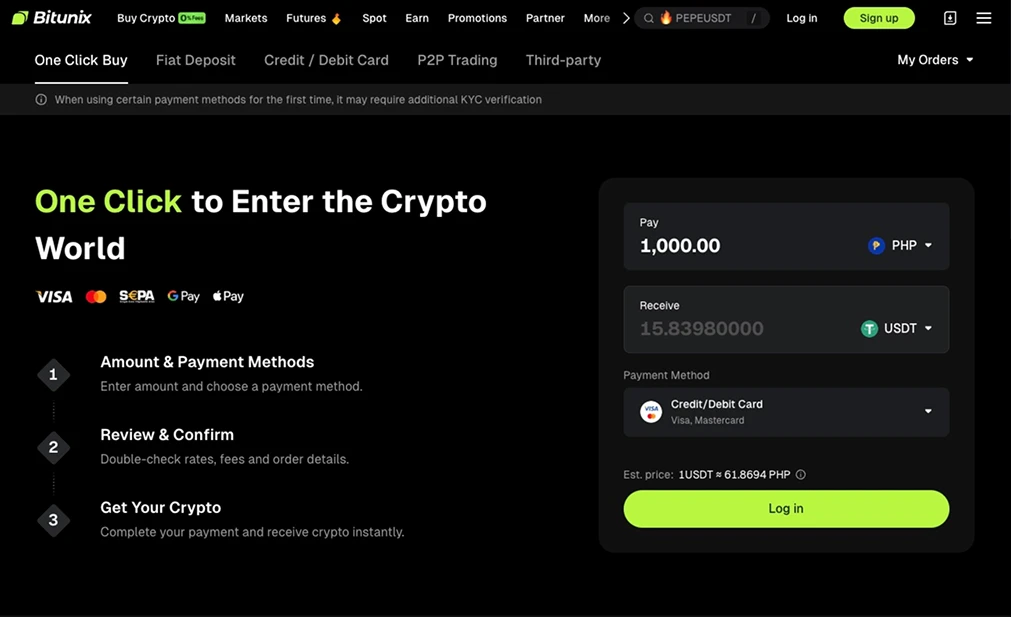
2. BingX
BingX has earned its popularity in the Philippines by turning crypto trading into a social experience. Launched in 2018, it now boasts a user base of over 20 million. It feels less like an exchange and more like a community where you can see what the "Elite Traders" are buying in real-time.
A key product is the "Futures Kickoff" feature, which allows new users to enter the futures market with as little as $10. This low barrier to entry, combined with a "Chainspot" feature that allows for on-chain trading directly from the exchange, simplifies the confusing world of DeFi.
The service is fully localized, offering seamless navigation and a wide range of PHP payment options. Its AI-driven "Grid Trading Bots" are particularly popular among busy professionals who want to automate their "buy low, sell high" strategies during the volatile market cycles.
Pros
- The Copy Trading ecosystem is world-class, featuring over 40,000 elite traders that beginners can mirror with a single click.
- BingX offers a unique 50% fee discount for new users, potentially dropping spot fees to as low as 0.05%, which is significantly cheaper than most exchanges.
- The platform also bridges the gap to traditional finance, allowing Filipinos to trade indices and commodities alongside their crypto assets from a single dashboard.
Cons
- Like many global platforms, BingX lacks a local BSP license, which might be a deterrent for investors who prioritize local regulatory oversight.
- The platform’s user interface cannot be used in Tagalog.
- Advanced features like "Martingale Bots" require a steep learning curve to use profitably without risking significant capital.
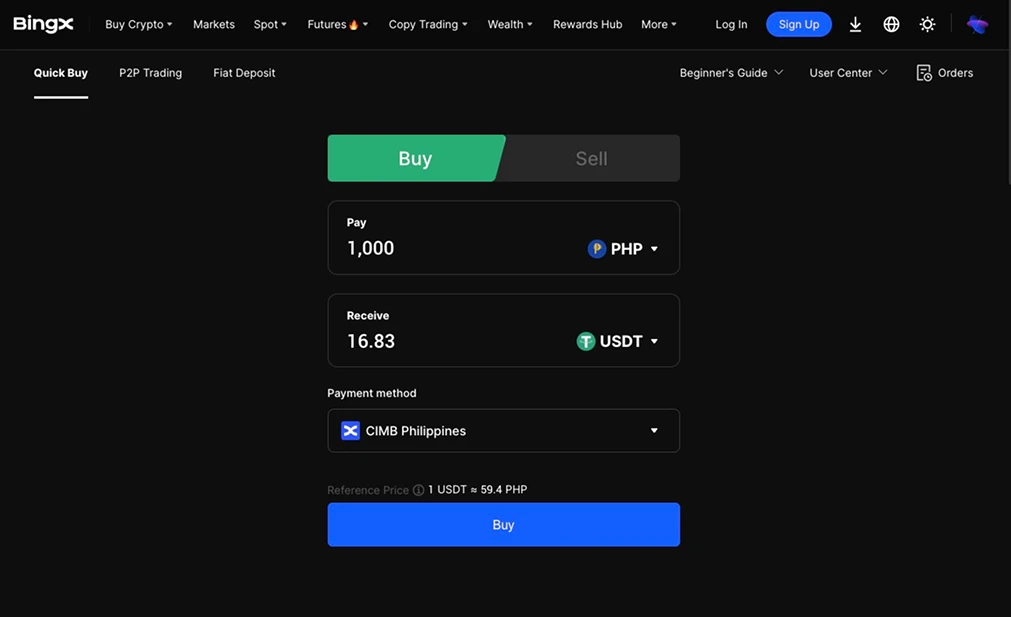
3. Bitget
Bitget has built its reputation around advanced derivatives and copy trading. Launched in 2018, the exchange supports spot trading, USDT-margined futures, and a large copy trading marketplace that allows Filipino users to follow top-ranked global traders with predefined risk settings.
The Bitget Wallet has become a staple for everyday use, allowing users to spend their crypto via a virtual Mastercard at millions of local merchants. This integration of spending, saving, and "on-chain rewards" through their Rewards Hub makes Bitget a comprehensive financial tool.
The platform maintains a $600 million Protection Fund and provides 1:1 Proof of Reserves. This level of institutional-grade safety is rare in the high-leverage space. The exchange also supports a unique "Bot Copy Trading" service, where users can subscribe to successful algorithmic strategies.
Pros
- The $600M Protection Fund provides a massive safety net against hacks or fraud, offering a level of security that many smaller exchanges cannot match.
- Filipino users can earn passive rewards through the Rewards Hub just by performing everyday tasks like checking in or making small trades.
- The user interface can be used in both Tagalog and English.
Cons
- The profit-sharing model means that successful copy-traders must give up 10% to 20% of their gains to the elite trader they are following.
- With 120 million users, the sheer size of the platform can lead to slower response times from customer support during major market crashes.
- The platform is not registered with the BSP or SEC but does hold multiple global licenses.
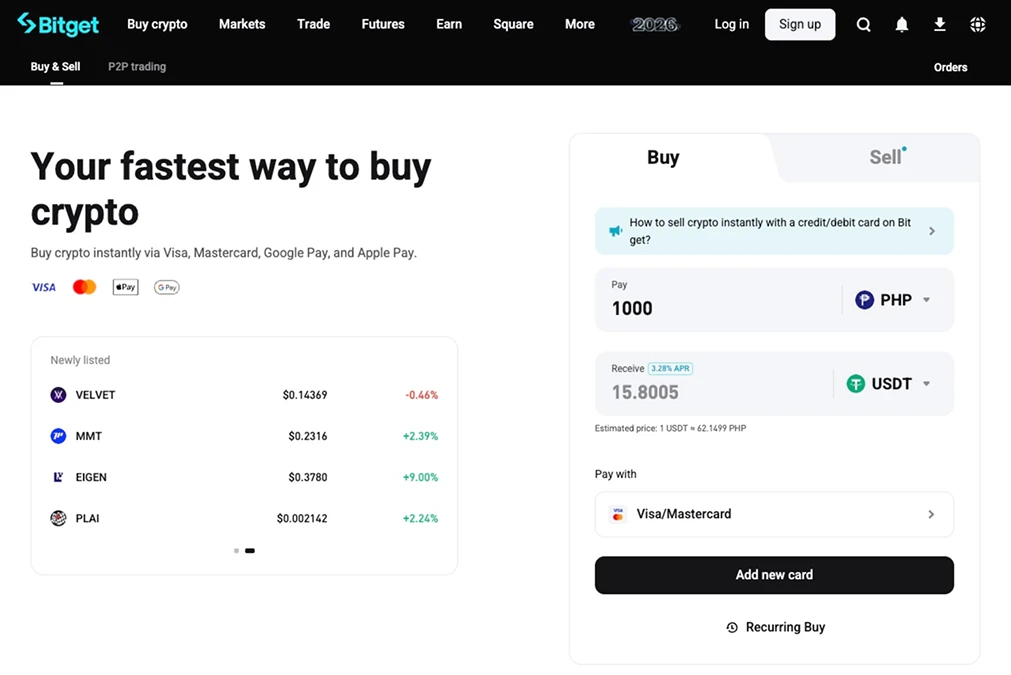
4. HTX
HTX (formerly Huobi) is one of the oldest exchanges in the industry, having launched in 2013. It offers a broad suite of services including spot trading, futures, options, and earning options. For Filipino users focused on yield, HTX’s staking and flexible savings products are a key draw.
While other platforms focus on leverage, HTX has doubled down on its "Earn" products, offering staggering APYs that can reach up to 300% on select high-growth tokens and new listings. This makes it the preferred destination for investors who want their idle assets to work for them.
HTX's 2026 strategy includes a heavy focus on Pre-Market Perpetual Futures, allowing users to take leveraged positions on the future price of unlisted tokens. This high-risk, high-reward product is supported by deep liquidity and a decade-long track record of operation since 2013.
Pros
- The platform’s mobile app is highly responsive, featuring a dedicated "Earn" tab that simplifies the process of allocating capital into various yield-generating pools.
- There are a variety of PHP deposit methods supported, including Paymaya and GCash.
- With a history stretching back to 2013, HTX is one of the oldest and most "battle-tested" exchanges in existence, surviving multiple market cycles.
Cons
- The highest APY rates are often reserved for highly volatile, low-cap tokens that carry a significant risk of price collapse.
- It does not provide Filipino language support.
- Like its global peers, HTX is not BSP-licensed, which means users do not have the same legal recourse as they would with a local Philippine firm.
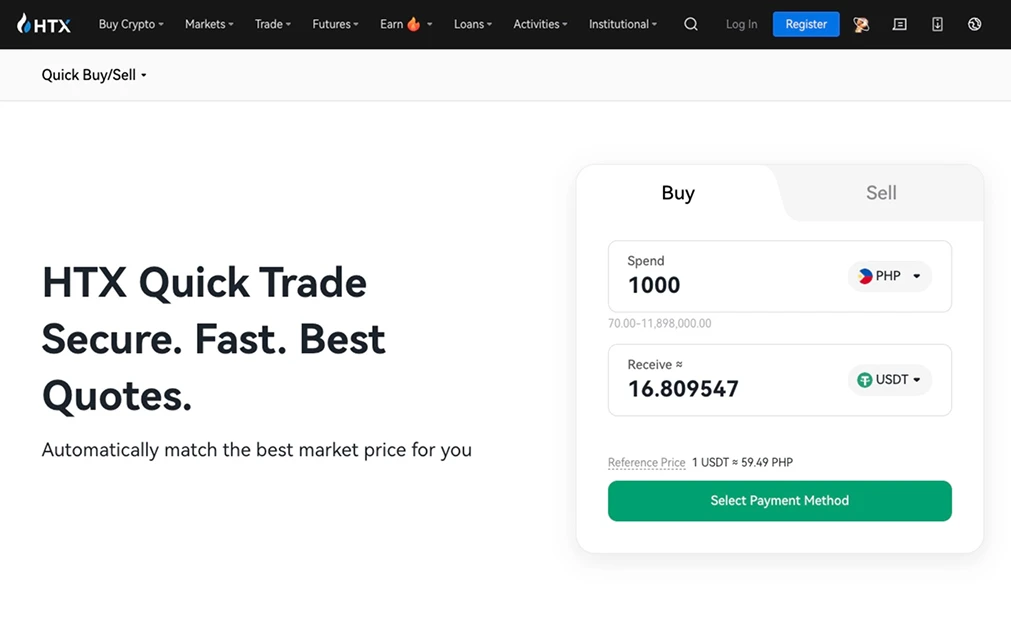
5. MEXC
MEXC is widely used by traders who want aggressive exposure to crypto derivatives. Founded in 2018, the exchange is known for offering some of the highest leverage in the industry, with futures products reaching up to 500x on hundreds of perpetual contracts.
With over 40 million users and more than 3,500 listed trading pairs, MEXC is known for listing new tokens faster than almost any other centralized exchange in the world. One of the reasons for its popularity is its aggressive fee structure: 0% maker fees on both spot and futures trading.
The exchange offers a streamlined experience with localized language support and high-speed execution. Its daily airdrop program for MX token holders provides a steady stream of new tokens to loyal users, making it a popular choice for those who like to "farm" small projects.
Pros
- MEXC's 0% Maker Fee policy is a massive competitive advantage, allowing traders to keep 100% of their spread profits.
- The availability of 500x leverage is unmatched among major exchanges, providing the ultimate tool for capital-efficient trading.
- The platform is accessible in Tagalog and English. It also provides local customer support in the language.
Cons
- MEXC does not have approval from BSP or the SEC but is regulated by several global authorities.
- The platform’s focus on speed and massive coin listings can lead to "low-quality" tokens occasionally being available to unsuspecting retail investors.
- The "Advanced KYC" requirements for high withdrawal limits can be quite intrusive compared to more privacy-focused exchanges.
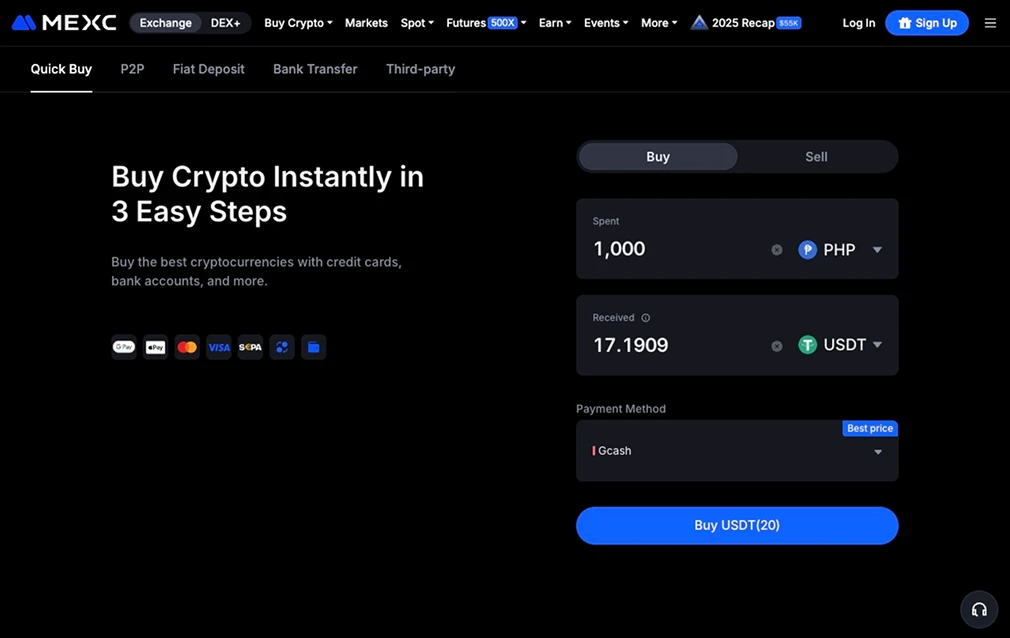
6. Coins.ph
Coins.ph remains the home favorite and the most trusted gateway for the majority of Filipinos. Founded in 2014 and fully regulated by the BSP, it has evolved from a simple wallet into a powerhouse for the local digital economy, boasting over 18 million users and its own stablecoin, PHPC.
The platform is essentially an all-in-one financial app. Beyond its Coins Pro exchange, users can pay over 120 different utility bills, buy mobile load, and send money to anyone in the Philippines. It is the bridge between the traditional banking system (InstaPay/PESONet) and the blockchain.
Coins.ph is also a leader in the local Web3 movement, offering a secure custodial wallet that supports major assets like BTC, ETH, and XRP. For Filipinos who value legality and local accountability above all else, Coins.ph is the gold standard.
Pros
- Coins.ph offers the highest level of consumer protection and legal recourse available to Filipino citizens.
- No other platform offers easier "Cash-In" and "Cash-Out" via InstaPay, PESONet, and over-the-counter remittance centers.
- The ability to pay bills and buy load directly with crypto or PHP makes it the most practical app for daily life in the Philippines.
Cons
- The selection of 170+ cryptocurrencies is significantly smaller than global giants like Bitunix or MEXC.
- Trading fees on the standard "Convert" feature are generally higher than the professional "maker/taker" rates found on global derivatives platforms.
- Being a regulated local entity, mandatory KYC is strictly enforced, which may not appeal to users seeking total anonymity.
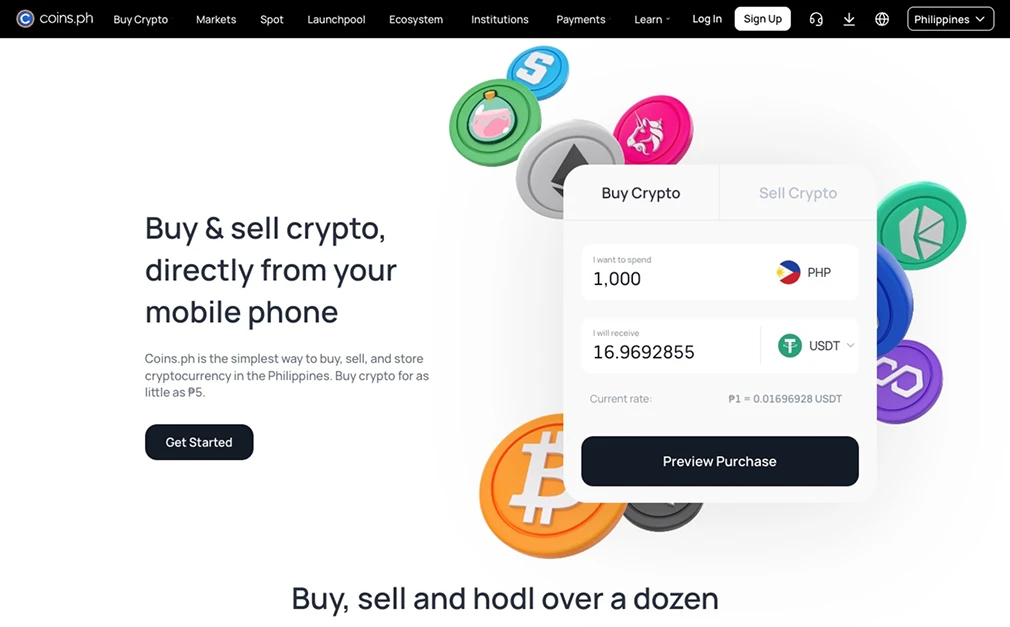
How to Choose a Crypto Exchange in the Philippines
Selecting a cryptocurrency exchange in the Philippines for 2026 requires a focused strategy, as the country’s digital asset landscape is governed by a dual-agency framework from the Bangko Sentral ng Pilipinas (BSP) and the Securities and Exchange Commission (SEC).
To ensure your funds are protected and your trading experience is efficient, follow this expert guide to identifying a top-tier platform.
Step 1: Confirm Local or Global Authorization
The most important step is to verify that an exchange is licensed to operate in the Philippines. Users can pick between a local or global option that holds licenses overseas. For those looking for a compliant regional exchange, it must hold two specific designations:
- Virtual Asset Service Provider (VASP): Issued by the BSP to ensure the platform follows strict anti-money laundering (AML) and "Travel Rule" protocols.
- Crypto-Asset Service Provider (CASP): A newer requirement from the SEC that mandates that the entity must be a locally incorporated company with a minimum paid-up capital of PHP 100 million and a physical office in the country.
Step 2: Assess PHP Deposit Options
For Filipino traders, the ability to move the Philippine Peso (PHP) in and out of an exchange without high conversion losses is vital. Look for platforms that support the following local payment systems:
- InstaPay and PESONet: These enable real-time or same-day bank transfers from major institutions such as BDO, BPI, and UnionBank.
- Mobile Wallets: Native integration with GCash and Maya is the gold standard for convenience, allowing for instant "Cash-In" and "Cash-Out" features directly from your phone.
- Digital Banks: Platforms that partner with digital-first banks like GoTyme or Maya Bank often provide lower transfer fees and higher interest rates on idle fiat balances.
Step 3: Evaluate Security Measures
Security in 2026 goes beyond a simple password. A reputable Philippine exchange should demonstrate:
- Cold Storage Protocols: At least 90% of user assets should be stored in offline, multi-signature wallets to mitigate the risk of cyberattacks.
- Proof of Reserves (PoR): Check if the exchange publishes verified, third-party audit reports that prove they hold customer assets at a 1:1 ratio.
- Local Accountability: Because CASP rules require a physical office in the Philippines, prioritize exchanges where you can reach a local compliance officer or visit a physical support center if needed.
Step 4: Understand the Costs of Trading
Don’t be misled by "zero-fee" marketing. A detailed analysis of costs should include:
- The Spread: Often found in "Instant Buy" features, the spread is the difference between the market price and the price the exchange offers you. A wide spread can be more expensive than a transparent trading fee.
- Maker/Taker Fees: Professional trading interfaces typically use this model. Makers (those adding liquidity) usually pay lower fees, sometimes as low as 0.1%.
- PHP Withdrawal Fees: Check the flat rate for withdrawing your funds to your bank or e-wallet.
Step 5: Prioritize Mobile & Local Support
The Philippines is a mobile-first economy. Ensure the exchange offers a robust app that handles high traffic without lagging during market volatility.
Furthermore, prioritize platforms that offer 24/7 localized customer support in both English and Tagalog. Having access to a support team that understands local banking holidays and Philippine financial regulations can save you significant time during a dispute or technical issue.
Crypto & Bitcoin Regulation in the Philippines
In 2026, the Philippines stands as one of Asia's most strictly regulated crypto markets. The multi-agency framework is led by the Bangko Sentral ng Pilipinas (BSP) and the Securities and Exchange Commission (SEC).
This structure prioritizes consumer protection, financial stability, and the prevention of illicit activities following the country's successful removal from the FATF "grey list" in February 2025.
The Central Bank: VASP Framework
The Bangko Sentral ng Pilipinas (BSP) remains the primary overseer of Virtual Asset Service Providers (VASPs). Under Circular No. 1108, any entity facilitating the exchange, transfer, or custody of digital assets must secure a VASP license.
- Indefinite Moratorium: As of 2026, the BSP has extended its moratorium on new VASP licenses indefinitely. This pause allows the central bank to focus on supervising existing exchanges and ensuring they meet high operational standards.
- Capital Requirements: Regulated VASPs must maintain a minimum paid-in capital of PHP 50 million for custodial services.
- The Travel Rule: In alignment with FATF Recommendation 16, the Philippines strictly enforces the "Travel Rule," requiring the collection and transmission of originator and beneficiary information for transactions exceeding specific thresholds.
The SEC: CASP Rules
A major milestone occurred in July 2025 when the Securities and Exchange Commission (SEC) implemented the Rules on Crypto-Asset Service Providers (CASP). These rules apply to any entity targeting the Philippine market.
- Corporate Registration: All CASPs must be registered corporations with a physical office in the country.
- Capitalization: The SEC requires a minimum paid-up capital of PHP 100 million (in cash or property, excluding crypto-assets) to ensure institutional solvency.
- Token Registration: Any "crypto-asset security" must be registered with the SEC before being sold to the public. Offerors must publish a detailed disclosure document (White Paper) at least 30 days before marketing.
- Consumer Protection: Platforms must adhere to the Financial Products and Services Consumer Protection Act, ensuring transparent fee structures and robust dispute resolution mechanisms.
How Does BIR Tax Crypto?
The Philippine Bureau of Internal Revenue (BIR) has refined its approach to digital assets, moving away from ambiguity toward a framework based on existing tax laws and the recently implemented Revenue Regulations on Digital Services.
While no singular "Crypto Tax Act" exists, the BIR treats cryptocurrency as a taxable asset, and the "VAT on Digital Services" (RA 12023) has introduced new obligations for service providers.
Income Tax for Individuals
Filipinos are required to report all crypto-related income in their annual filings. Under the updated TRAIN Law brackets for 2026, the following applies:
- PHP 250,000 and below: 0% (Exempt)
- PHP 250,001 - PHP 400,000: 15% of excess over PHP 250,000
- PHP 400,001 - PHP 800,000: PHP 22,500 + 20% of excess over PHP 400,000
- PHP 800,001 - PHP 2,000,000: PHP 102,500 + 25% of excess over PHP 800,000
- Over PHP 8,000,000: PHP 2,202,500 + 35% of excess over PHP 8,000,000
Self-employed individuals or freelancers with gross sales below PHP 3 million may opt for a simplified 8% flat tax on the excess of PHP 250,000 in lieu of graduated rates and percentage taxes.
Income Tax for Businesses
- Crypto trading income recognized by a corporation is generally taxed under corporate income tax rules (the standard corporate rate framework is widely summarized at 25%, with a preferential 20% rate for qualifying domestic MSMEs based on thresholds).
- If your activity is considered “in the course of trade or business,” business taxes may also apply (VAT or percentage tax), depending on registration status and revenue thresholds.
Value-Added Tax (VAT)
A major change in 2026 is the full enforcement of Republic Act No. 12023. This law mandates a 12% Value-Added Tax (VAT) on digital services consumed in the Philippines.
- Non-Resident Providers: Foreign exchanges and service providers (like global DEXs or NFT marketplaces) targeting the Philippine market must register with the BIR and collect 12% VAT on their service fees (e.g., trading fees or subscription costs).
- Direct Transactions: Peer-to-peer (P2P) transfers are generally exempt from VAT, as they are not "services" but the exchange of property.
If you earn from crypto in the Philippines, treat it like real income: track every receipt and disposal, translate amounts to PHP on the correct dates, and report under the tax category that matches your facts (investor vs business vs compensation).
Cryptocurrency Adoption in the Philippines
The Philippines is a global leader in digital asset integration. According to Statista Market Insights, the country’s cryptocurrency revenue is approximately US$1.2 billion, reflecting a mature ecosystem where digital currencies are deeply embedded in the local economy.
With a user base of 13.2 million people, nearly 11.21% of the Filipino population now engages with digital assets, a significant increase from previous years, highlighting the nation's rapid digital transformation. Below is a quick breakdown of the crypto market in the Philippines:
- Market Value: Total revenue is projected to remain a steady US$1.2 billion throughout 2026.
- User Base: Reaching a milestone of 13.2 million active users.
- Penetration Rate: A climb to 11.21% from 10.49% in the previous year, positioning the Philippines as a top-tier market for retail crypto adoption.
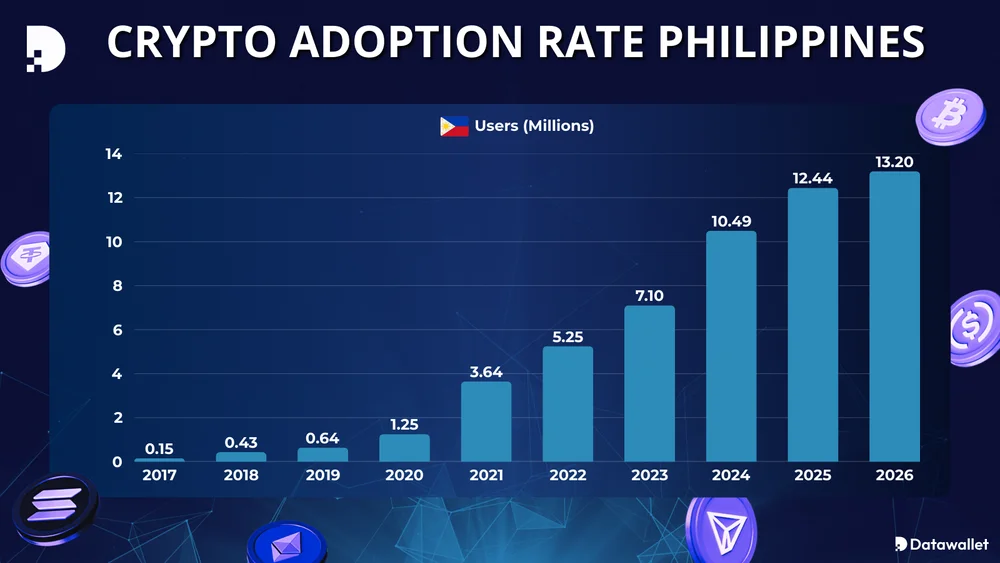
How to Buy Bitcoin in the Philippines
Buying Bitcoin in the Philippines is straightforward, but the safest approach is to follow a clear, regulated process. Whether you are a resident or an overseas Filipino managing funds from abroad, the steps below explain how to buy BTC through legal platforms.
- Choose a Licensed Exchange: Start by selecting a crypto exchange that is formally registered with the Bangko Sentral ng Pilipinas (BSP) as a virtual asset service provider.
- Create an Account: Once you choose a platform, register with your email address and set a strong password. You will then complete identity verification, which usually involves uploading a government-issued ID and a short facial check.
- Deposit Philippine Pesos (PHP): To buy Bitcoin, you first need to fund your account in PHP. Most exchanges support local bank transfers and popular e-wallets such as GCash, making deposits accessible through major Philippine banks.
- Buy Bitcoin: After your PHP balance appears, navigate to the Bitcoin market and select the BTC/PHP trading pair or an instant buy option. Enter the amount you want to purchase, review the price and fees, and confirm the transaction.
While exchanges provide built-in wallets, keeping Bitcoin on a platform long-term carries counterparty risk. For larger balances or long-term holding, transferring BTC to a personal hardware wallet gives you full control over your private keys and improves security.
Final Thoughts
Choosing the right crypto exchange in the Philippines ultimately comes down to balancing your appetite for risk with your need for local regulatory protection.
If you value legal accountability and easy bill payments above all else, Coins.ph remains the gold standard for daily utility; however, for those seeking lower fees, high-leverage futures, or global copy-trading communities, platforms like Bitunix and Bitget offer superior technical tools.
As the BSP and SEC continue to tighten oversight in 2026, ensure you prioritize platforms that offer transparent proof-of-reserves and seamless PHP integration through InstaPay or GCash to avoid high conversion slippage.
Frequently asked questions
Can I use cryptocurrency for online payments in the Philippines?
Yes, many merchants and online businesses in the Philippines accept cryptocurrencies, particularly Bitcoin and Ethereum. Platforms like Coins.ph further simplify the payment process, allowing you to conveniently pay bills or buy mobile load directly with crypto.
What are the best hardware wallets for securing crypto in the Philippines?
While mobile apps are convenient for trading, long-term investors should use "cold storage" to prevent hacking. Popular hardware wallets in the Philippines include Ledger (Nano X/S Plus) and Trezor (Safe 3), both of which support a wide range of assets.
Is Peer-to-Peer (P2P) trading legal in the Philippines for 2026?
Yes, P2P trading remains a legal and popular method for Filipinos to buy and sell crypto using local payment apps like GCash and Maya. To stay safe, ensure you only use the "Verified Merchant" filters on global exchanges and always keep records of your transaction receipts for potential BIR tax audits.
Can I transfer my crypto earnings directly to a Philippine bank account?
Yes, you can transfer earnings via InstaPay (for amounts up to PHP 50,000) or PESONet (for larger amounts). Most BSP-licensed platforms like Coins.ph or Maya allow direct "Cash Out" to banks like BDO, BPI, and UnionBank.

Written by
Jed Barker
Editor-in-Chief
Jed, a digital asset analyst since 2015, founded Datawallet to simplify crypto and decentralized finance. His background includes research roles in leading publications and a venture firm, reflecting his commitment to making complex financial concepts accessible.

.webp)

.webp)





